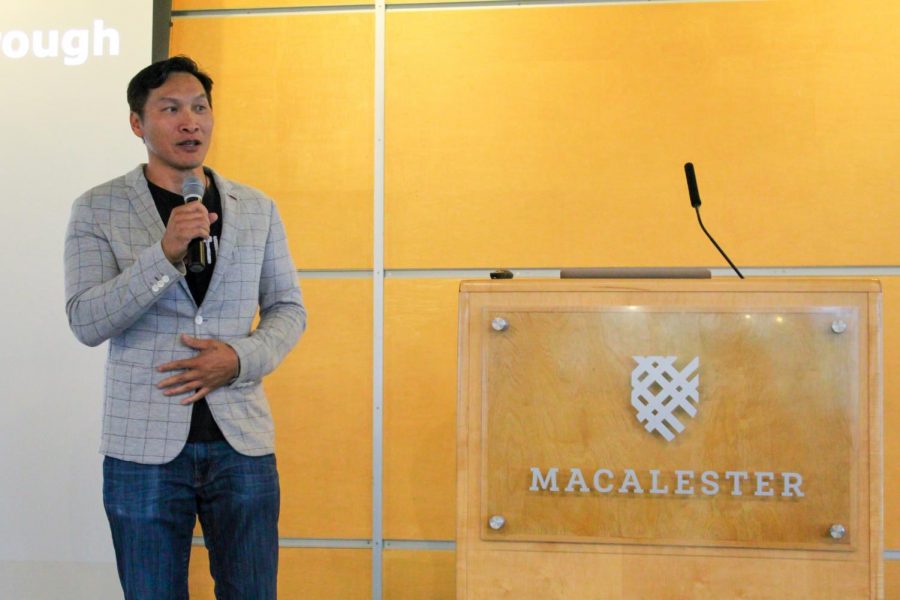International Roundtable expands reach, addresses (de)carceration
Co-founder of the Asian Prisoner Support Committee Eddy Zheng speaks at the 2019 International Roundtable. Photo courtesy of IGC student workers.
October 17, 2019
Last week, Macalester hosted its 26th Annual International Roundtable (IRT). The event was titled Incarceration (Un)Interrupted: Reclaiming Bodies, Lands, and Communities, and explored the implications of incarceration on bodies and society at large.
Faculty in the anthropology, American studies, theater & dance, sociology and political science departments partnered with staff at the Kofi Annan Institute for Global Citizenship (IGC) and the Department of Multicultural Life (DML) to plan the event.
This year, efforts by Dean of the IGC Donna Maeda to enhance the accessibility of the event led to a larger committee and broader range of perspectives included during the planning process.
“The idea came out of a collection of faculty and staff addressing issues pressing on their own work,” theater & dance professor Harry Waters Jr. said. “We’re in a time where people are still being shot, [and] we have the [highest] incarceration rate in the world. So [incarceration] sort of rose to the top of the things we’re concerned about.”
Dean of Multicultural Life Marjorie Trueblood concurred — emphasizing the role citizens play in perpetuating the cycle of incarceration.
“Whether we acknowledge it or not, we have been complicit [in] the carceral system which has led to displacement, loss of agency, and in some ways undermined our democracy,” Trueblood wrote in an email to The Mac Weekly. “We thought it was important to further our thinking in these areas.”
As one of the few faculty of color on the committee, Waters felt he had a pivotal role in the planning of the event — which focused on themes that disproportionately affect marginalized communities.
“There was a moment where I felt I had to step forward into some of the conversations to really make sure that we were looking at this a little bit more comprehensively, particularly for black people in the United States,” Waters said. “That really adjusted and shifted the conversation and the choices that we were making.”
Johns Hopkins University lecturer Stuart Schrader, prison reform activist Eddy Zheng and Williams College humanities professor Joy James served as plenary speakers.
In addition to their plenary events, students organized and facilitated a number of events on their own throughout Thursday and Friday.
Mandy Ortiz ’21 facilitated a panel titled “Withholding from Removal: The Defensive Asylum Process and its Lasting Impacts” with Willow Fortunoff ’21, Fatiya Kedir ’21 and Emma Verges ’21, during which attendees examined four asylum cases and decided whether to grant asylum in each case — weighing factors like credible threats.
Ortiz’s experience as a human trafficking fellow at the non-profit organization The Advocates for Human Rights motivated her to create the workshop. As a fellow, she helped asylum seekers.
“I feel like we in classes talk a lot about immigration and the negative parts of that, but it’s not necessarily tangible,” Ortiz said. “There are a lot of students on this campus who are directly impacted by immigration policy, but there are also a lot of students who will never have to think about that outside of a classroom.
Ortiz said that the issues with incarceration are systemic and complex, which can prevent students from talking about them.
“So many people leave these sessions and are overwhelmed by the impact that they had on them because this is when it becomes real, and reality feels surreal,” Ortiz said.
Along the same lines, Olivia Sailors ’20, Madeline Karp ’20 and Deborah Pickford ’20 facilitated a panel discussing important issues related to the school-to-prison pipeline. Titled “Breaking Chains: Liberatory Practices for Dismantling Schools as Prisons,” the session brought local NAACP members and former inmates to campus to discuss how to liberate schools.
“To end up at an institution as selective and prestigious as Macalester, it means that most of us learned the implied rules of school environments early on and that we needed to be compliant to acquire certain privileges,” Sailors wrote in an email to The Mac Weekly.
“It is essential to discuss how our own institution plays a role in the continuation of the systematic racism that fuels mass incarceration,” Karp wrote in an email to The Mac Weekly. “Macalester students, especially those who are white, must take it upon themselves to act upon the privileges we are awarded by attending a predominantly white, very wealthy institution.”
This year’s IRT facilitated groups to offer students a place to reflect on what they learned at the event — with the organizers stressing the importance of continuing these conversations beyond the event.
“We hope that people will continue to think deeply about the implications that the carceral system has on our lives and the marginalization that it continues to perpetuate,” Trueblood wrote.
“This is an opportunity for students to step up,” Waters said. “If people are waiting to be told what to do next, that’s kind of missing the point. Revolution came because students decided to do something. It didn’t happen because they were given permission by the powers that be.”













